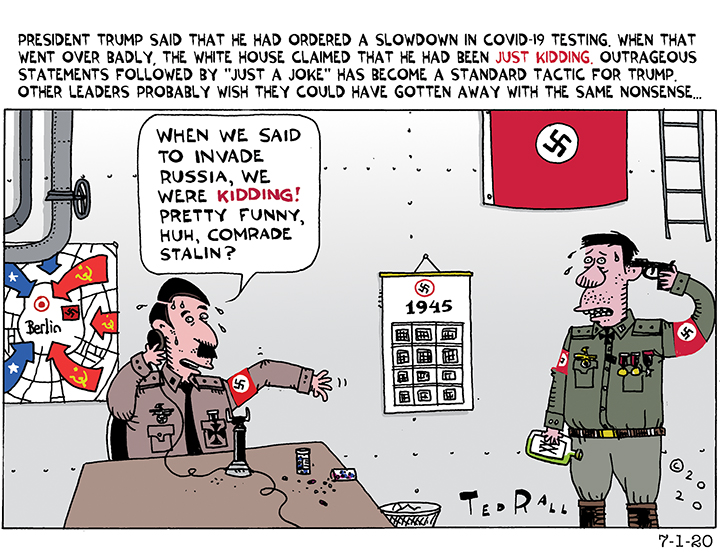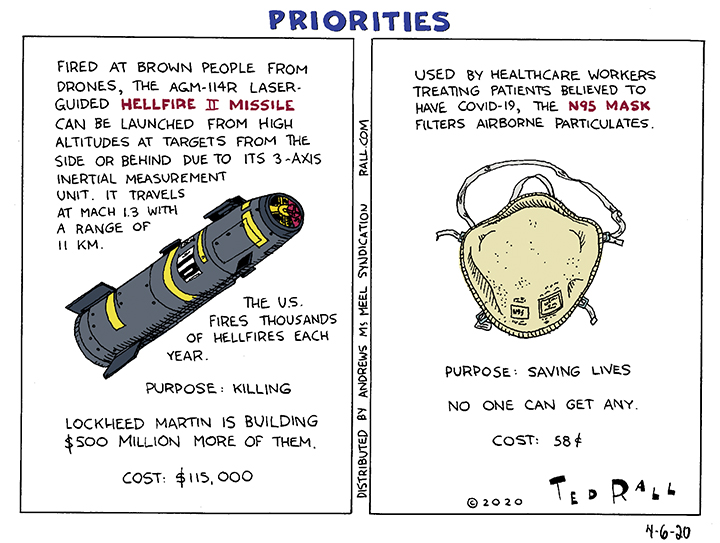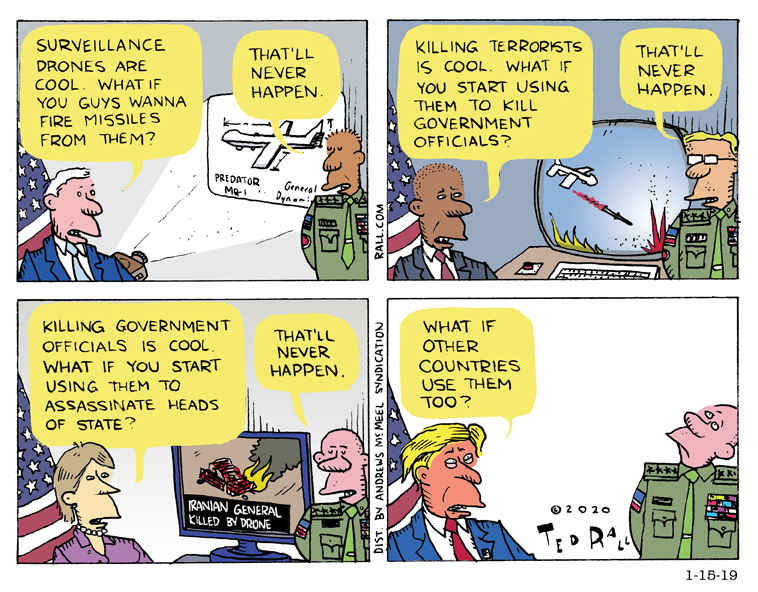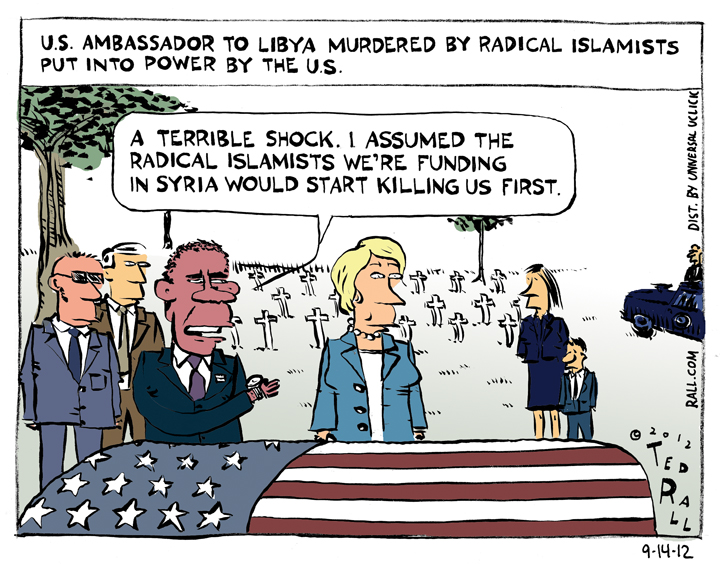A standard tactic for President Trump is to say something aggressively insane and then if it doesn’t go over well, pretend that he is simply just joking. I’m sure other historical figures would have loved to have deployed such a ridiculous tactic.
Sick from Our Sick Priorities
What a society spends its resources on reveals its priorities. The United States military has endless resources and massive budgets which it uses to slaughter people around the world for fun and profit. Now the United States healthcare system is under attack by the COVID-19 pandemic, and healthcare workers (not to mention ordinary citizens) can’t even find a $0.58 face mask.
Other Countries Using Drones to Kill Our President? That’ll Never Happen
Nothing embodies the law of unintended consequences more than weapons systems. When drones were first introduced as possible battlefield tools, contractors said that there was nothing to worry about in terms of them being converted into weapons systems. They would only be used for surveillance. Now we’re using them to kill top government officials.
SYNDICATED COLUMN: Suicide? No. Society Is Murdering Us. But There Is a Way Out.
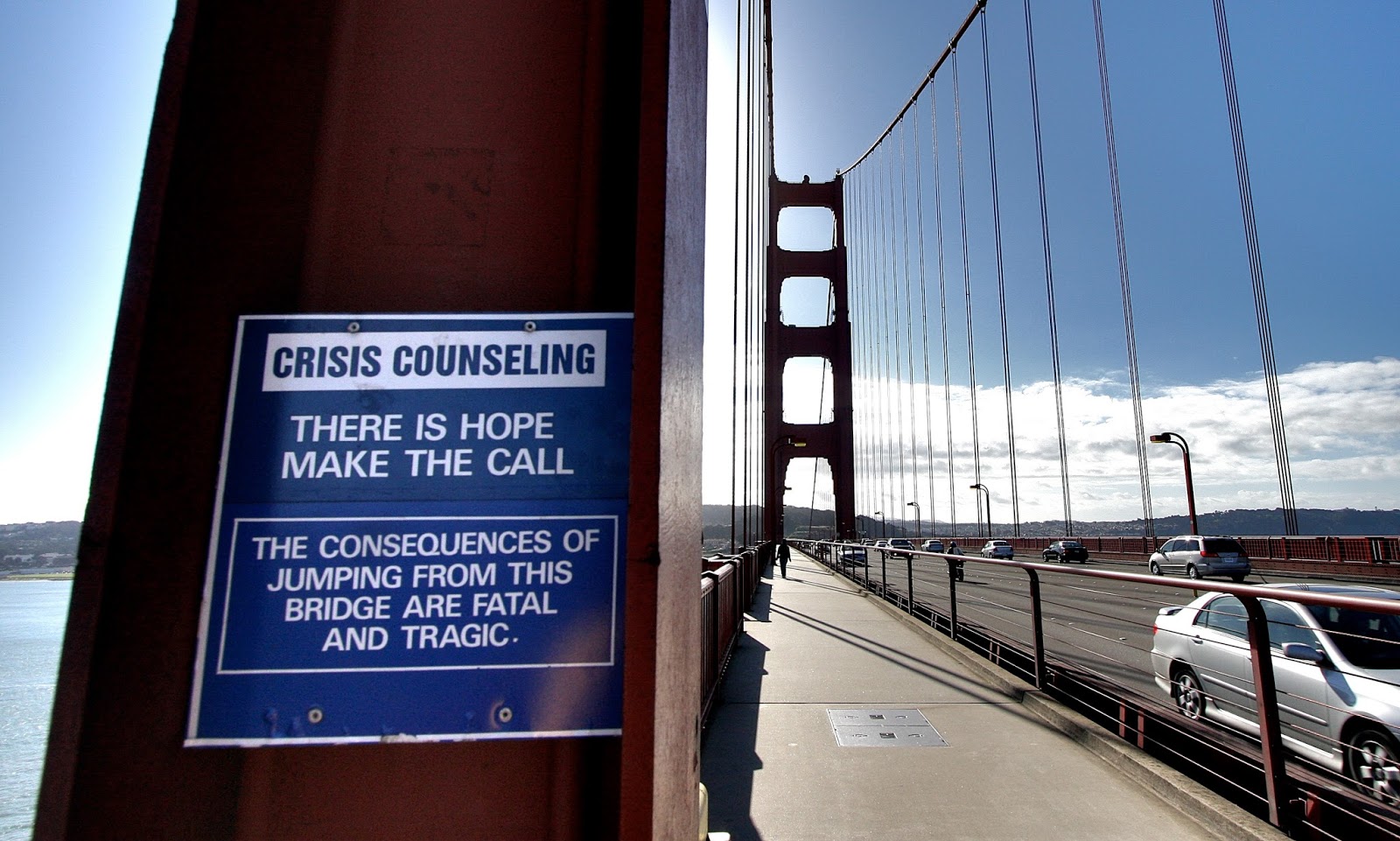
They say that 10 million Americans seriously consider committing suicide every year. In 1984, when I was 20, I was one of them.
Most people who kill themselves feel hopeless. They are miserable and distraught and can’t imagine how or if their lives will ever improve. That’s how I felt. Within a few months I got expelled from college, dumped by a girlfriend I foolishly believed I would marry, fired from my job and evicted from my apartment. I was homeless, bereft, broke. I didn’t have enough money for more than a day of cheap food. And I had no prospects.
I tried in vain to summon up the guts to jump off the roof of my dorm. I went down to the subway but couldn’t make myself jump in front of a train. I wanted to. But I couldn’t.
Obviously things got better. I’m writing this.
Things got better because my luck changed. But — why did it have to? Isn’t there something wrong with a society in which life or death turns on luck?
I wish I could tell my 20-year-old self that suicide isn’t necessary, that there is another way, that there will be plenty of time to be dead in the end. I’ve seen those other ways when I’ve traveled overseas.
In Thailand and Central Asia and the Caribbean and all over the world you will find Americans whose American lives ran hard against the shoals of bankruptcy, lost love, addiction or social shame. Rather than off themselves, they gathered their last dollars and headed to the airport and went somewhere else to start over. They showed up at some dusty ex-pat bar in the middle of nowhere with few skills other than speaking English and asked if they could crash in the back room in between washing dishes. Eventually they scraped together enough money to conduct tours for Western tourists, maybe working as a divemaster or taking rich vacationers deep-sea fishing. They weren’t rich themselves; they were OK and that was more than enough.
You really can start over. But maybe not in this uptight, stuck-up, class-stratified country.
I remembered that in 2015 when I suffered another setback. Unbeknownst to me, the Los Angeles Times — where I had worked as a cartoonist since 2009 – had gotten itself into a corrupt business deal with the LAPD, which I routinely criticized in my cartoons. A piece-of-work police chief leveraged his department’s financial influence on the newspaper by demanding that the idiot ingénue publisher, his political ally, fire me as a favor. But mere firing wasn’t enough for these two goons. They published not one, but two articles, lying about me in an outrageous attempt to destroy my journalistic credibility. I’m suing but the court system is slower than molasses in the pre-climate change Arctic.
Suicide crossed my mind many times during those dark weeks and months. Although I had done nothing wrong the Times’ smears made me feel ashamed. I was angry: at the Times editors who should have quit rather than carry out such shameful orders, at the media outlets who refused to cover my story, at the friends and colleagues who didn’t support me. Though many people stood by me, I felt alone. I couldn’t imagine salvaging my reputation — as a journalist, your reputation for truthtelling and integrity are your most valuable asset and essential to do your job and to get new ones.
As my LA Times nightmare unfolded, however, I remembered the Texas-born bartender who had reinvented himself in Belize after his wife left him and a family court judge ordered him to pay 90% of his salary in alimony. I thought about the divemaster in Cozumel running away from legal trouble back in the States that he refused to describe. If my career were to crumble away, I could split.
You can opt out of BS without having to opt out of life.
Up 30% since 1999, suicide has become an accelerating national epidemic — 1.4 million Americans tried to kill themselves in a single year, 2015 — but the only times the media focuses on suicide is when it claims the lives of celebrities like Kate Spade and Anthony Bourdain. While the media has made inroads by trying to cover high-profile suicides discreetly so as to minimize suicidal ideation and inspiring others to follow their example, it’s frustrating that no one seems to want to identify societal and political factors so that this trend might be reversed.
Experts believe that roughly half of men who commit suicide suffer from undiagnosed mental illness such as a severe personality disorder or clinical depression. Men commit suicide in substantially higher numbers than women. The healthcare insurance business isn’t much help. One in five Americans is mentally ill but 60% get no treatment at all.
Then there’s stress. Journalistic outlets and politicians don’t target the issue of stress in any meaningful way other than to foolishly, insipidly advise people to avoid it. If you subject millions of people to inordinate stress, some of them, the fragile ones, will take their own lives. We should be working to create a society that minimizes rather than increases stress.
It doesn’t require a lot of heavy lifting to come up with major sources of stress in American society. People are working longer hours but earning lower pay. Even people with jobs are terrified of getting laid off without a second’s notice. The American healthcare system, designed to fatten for-profit healthcare corporations, is a sick joke. When you lose your job or get sick, that shouldn’t be your problem alone. We’re social creatures. We must help each other personally, locally and through strong safety-net social programs.
Loneliness and isolation are likely leading causes of suicide; technology is alienating us from one another even from those who live in our own homes. This is a national emergency. We have to discuss it, then act.
Life in the United States has become vicious and brutal, too much to take even for this nation founded upon the individualistic principles of rugged libertarian pioneers. Children are pressured to exhibit fake joy and success on social media. Young adults are burdened with gigantic student loans they strongly suspect they will never be able to repay. The middle-aged are divorced, outsourced, downsized and repeatedly told they are no longer relevant. And the elderly are thrown away or warehoused, discarded and forgotten by the children they raised.
We don’t have to live this way. It’s a choice. Like the American ex-pats I run into overseas, American society can opt out of crazy-making capitalism without having to opt out.
SYNDICATED COLUMN: It’s Mourning in America: Tacky and Weird
Somber is Out. Kitsch Reigns.
Americans don’t mourn right.
We are tacky.
We are gauche.
We turn tragedy into kitsch.
Last week’s news was dominated by the aftermath of the Tucson massacre: the memorial service, the funerals, even the reopening of the Safeway supermarket.
A memorial service at a sports arena. What is wrong with us?
I say “us” because this is not a Tucson thing or an Arizona thing. It’s all too American.
Thousands of cheering fans—er, mourners—donned “Together We Thrive: Tucson & America” T-shirts, handed out by the University of Arizona. They greeted the arrival of President Bar-Rock Star Obama with applause and wolf whistles. They interrupted with raucous hoots every couple of minutes—and he did nothing to tamp down the unruly crowd. Emergency responders got a standing ovation. Attendees clapped at the mention of the nine-year-old girl who was shot to death. Arizona governor Jan Brewer was booed.
Some called it unsettling, others unseemly. I thought it was weird and tacky. A memorial service should not feel like a WWE event.
On the lawn in front of the hospital where Congresswoman Gabrielle Giffords was being treated, USA Today reported, people placed “hundreds upon hundreds of hand-scrawled notes, stuffed animals and signs condemning the violence.”
Outside the Catholic church where the funeral for Christina Green, age 9, was being held, firefighters hung a patchwork quilt “National 9/11 Flag,” oddly blending politics, religion, and George W. Bush.
Creeeep-y.
Each mass tragedy amps up the volume and surreal inappropriateness of Americans’ public expressions of grief. After 9/11 New Yorkers posted “missing” posters for people they knew were dead. Stuffed animals and grammatically challenged notes, soggy and runny, hung from the fence at St. Paul’s Chapel near Ground Zero while vendors hawked cheap framed photos of the Twin Towers a few feet away.
Obama politicized Tucson. John McCain did the same at the televised memorial service for Pat Tillman. A group of pro-Bush 9/11 widows preened for the GOP at the 2004 Republican National Convention.
From memorial pages on Facebook to memorial decals on SUVs, Americans think anything goes when you’re mourning the death of a loved one—or someone whose death made national news, which somehow makes you want to feel involved even though, of course, you are not.
Everyone has to deal with death. No one can or should tell you how to feel. Yet you do have an obligation to comport yourself with dignity, to “stay calm and carry on,” as the British poster from World War II urged. Death is inevitable, horrible, often tragic and, as Sartre said, absurd. But please don’t drag the rest of the world into your psychological abyss. Spare society the tawdry and ostentatious displays of over-the-top yowling.
Just be sad. It’s OK.
My best friend died when I was 16. I never got over it. His death still makes me sad. I’m OK with that.
I wore a suit to his funeral. There wasn’t any cheering. I don’t think an appearance by the president or the attorney general would have reduced anyone’s grief. It was a sad thing, so sad that no one could make it better, and nobody tried.
As the cultural critic Marita Sturken wrote in her 2007 book “Tourists of History: Memory, Kitsch, and Consumerism from Oklahoma City to Ground Zero,” all this tacky phony sentimentality serves a sinister purpose. Mainstream American culture is being manipulated by government and big business to separate us from what is real—death and horror—and to obscure who is behind it—our government and big business.
“This comfort culture,” says Sturken,” can be found in everything from the small souvenirs that promise reassurance at sites like Ground Zero and the Oklahoma City memorial…Much of the culture of comfort functions as a form of depoliticization and as a means to confront loss, grief, and fear through processes that disavow politics…an American public can acquiesce to its government’s aggressive political and military policies, such as the war in Iraq, when that public is constantly reassured by the comfort offered by the consumption of patriotic objects, comfort commodities, and security consumerism.”
As the economy and political system continue to collapse, we will likely see more mass shootings and terrorist attacks. Thus we should be prepared. And we should give ourselves permission to get real about mourning.
So, as a public service to the grievers of the future, I hereby offer my
Basic Etiquette Following a Massacre:
(1) When interviewed on television never say that your “heart goes out to the victims and their families.” We have heard that hoary chestnut a million too many times. Keep your heart where it belongs, inside your ribcage.
(2) If you are a public official holding a press conference about a school shooting/workplace shooting/terrorist attack, refrain from thanking a long list of local and state officials for their help. This isn’t the Oscars. You haven’t won anything. You are not going to meet Joan Rivers.
(3) Whether attending a memorial service or actual funeral, leave your hoodies, baggy pants and tanktops at home. No baseball caps. No T-shirts. Don’t wear anything with a team logo. Appropriate clothing is formal, black or very dark blue. Men wear suits with ties. Women wear long dresses. Don’t got ’em? Stay home. You don’t get to be on CNN.
(4) If you know one or more of the victims, ask their surviving relatives whether they would prefer flowers or a donation to a preferred charity. Otherwise simply choose an appropriate charity and make a donation in their name. Do not waste money on flowers and stupid stuffed animals.
(5) Unless the victims include at least one politician, no politician should speak at the service. If there is at least one dead or wounded politician, politicians who do speak should refrain from political rhetoric.
(6) No. Applause. Ever.
NEXT WEEK: Toilet etiquette. How to wipe. How to flush.
(Ted Rall is the author of “The Anti-American Manifesto.” His website is tedrall.com.)
COPYRIGHT 2011 TED RALL

